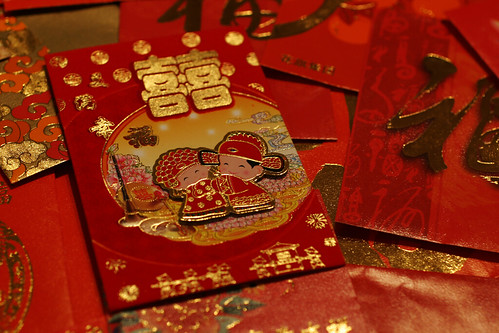
At the end of my third year teaching karate, the sensei who ran the dojo came by my house shortly before Christmas.
My mother answered the door; he left her with an envelope for me.
It contents:
a card, containing a few crisp fifty dollar notes and a thank you
one.
It was a pleasant surprise, and entirely unexpected: I'd been doing all that teaching as a volunteer, as part of my school's IB community service requirements. I was sixteen and it was the first time I'd been paid for work that I'd done.
It took an eternity for me to do anything with that money. The card lived on my desk for a few weeks, before being subsumed by a pile of other holiday cards from that year. The fifty dollar notes, however, went nowhere. Not into my wallet, not into a checking account. I certainly didn't use them.
Eventually, I bit the bullet and put that money in my wallet. Then I did what I always do with money: spent it, slowly, on little things here and there. Groceries, a bottle of juice on the way home from uni, birthday cards, books. Just like any other money.
In economics textbooks, money is described as
fungible: replaceable, interchangeable, one instance just as good as any other. It goes like this: A twenty dollar note is, for all practical purposes, the same as any other. There's no intrinsic value that causes that note to be any more or less dear than a pair of ten dollar notes. A tonne of crude oil is the same as any other tonne. That $32 Borders gift card from your aunt five years ago is exactly as much of a waste of plastic as my $32 Borders gift card.
This isn't exactly rocket science: people exploit the fungibility of money all the time. If someone owed you $20, they could pay you in a variety of ways: bank transfer, cash in hand,
or even by waiving $20 you owed them.
Some of these ways might be less convenient for you — and if they paid you in a pile of five cent coins you might feel obliged to drop a piano on them —
but there'd be no question that they'd paid you back.
(You've probably even seen something like this happen in real life:
Deetya currently owes Edwina $20, and one day Edwina borrows $20 from Francis to buy, let's say, a monocle. Edwina then says to Francis, Get Deetya to pay you the $20 she owes me.
IOUs act a bit like tender in small social circles.)

Credit: Flickr / davidortmann
But here's where I get confused. If I took my five one hundred dollar notes, deposited them at the bank, and withdrew them a week later, they wouldn't feel the same. The teller could give me back the exact same notes I gave them, serial numbers and all, and it still wouldn't feel like I was holding the same money I'd given away. It wouldn't be the same gift.
In my head, when I try to picture at what point it stops feeling like gift money, it's the moment when I deposit it.
Suddenly it's just another anonymous five hundred dollars sitting in my checking account. Its specialness has been tainted by touching normal money
.
If, instead, I grabbed all that money from my desk and spent it straight away on a really nice bottle of pasta sauce (for five hundred dollars, the tomatoes had better be freshly harvested from Mount Olympus), that would be that. It would be gift-pasta-sauce, just the same way that a movie ticket voucher spent on The Avengers 2 would feel just as much a gift as directly being given those tickets.
Now, I have no idea whether this is just me. I'm really interested in hearing other people's perspectives on this — would you treat cash gifts different to extra cash? (...oh man, if I get a bonus at work this year it's going to do my head in, isn't it...) Are vouchers more gift-like than cash? Can you spend half a Dymocks voucher today, and half next week?
...and with all the added stress picking and choosing brings, would you rather get $50
for your birthday,
or a $50 kitschy World's Best Daughter
mug you don't particularly care for?
No comments:
Post a Comment